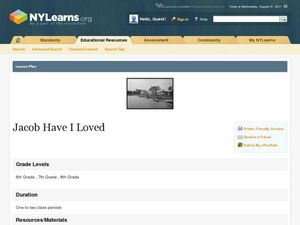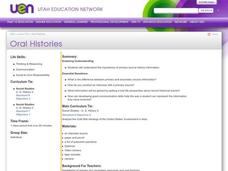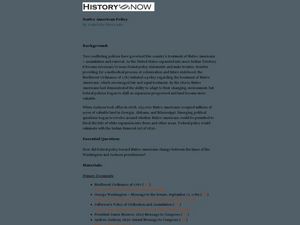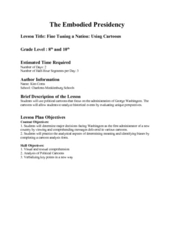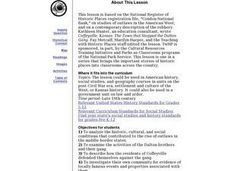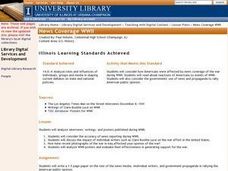The New York Times
Understanding the Mathematics of the Fiscal Cliff
What exactly is the fiscal cliff? What are the effects of changing income tax rates and payroll tax rates? Your learners will begin by reading news articles and examining graphs illustrating the "Bush tax cuts" of 2001 and 2003. They...
Curated OER
Conceptual Analysis in Economics
Learners practice critical thinking skills by defending their beliefs orally in a "hot seat". In addition, they communicate their feelings about an inssue in writing.
Curated OER
Circular Flows
To study circular flow, learners use the plans to trace through a series of interconnected economic and financial flows to explain the workings of the American economy. They use the model developed to comprehend the effects of Federal...
Curated OER
Advocates for Disabilities
Young scholars research people who have contributed to making life better for the disabled. In this advocacy lesson students enter the names of advocates on cards and divide into groups. Young scholars complete a worksheet based on the...
Curated OER
A River Ran Wild: An Environmental History
The Nashua River serves as the focal point of an investigation of the treatment of and care for natural resources. A reading of A River Rand Wild: An Environmental History by Lynne Cherry, launches the study and class members consider...
Constitutional Rights Foundation
The Election of 1912
The Election of 1912: an election with four competitive opponents. Pupils get to know the candidates with informative reading passages that provide context to the election. Then, the class engages in a debate and answers questions as one...
Curated OER
America Established Because of Protest
Students explore events and causes that led to American Revolution and examine popular pro-Patriot renderings and texts of these issues created both at that time and in later years. Students then prepare and deliver oral presentations...
Curated OER
Jacob Have I Loved
Students examine visual images about the novel, Jacob Have I Loved. They compare pictures from "America from the Great Depression to World War II" that are described in the book and other studies of the Chesapeake Bay. They present their...
Curated OER
Cold War Roots and Events
Ninth graders examine the causes and major events of the Cold War. They listen to a lecture and fill in the blanks on a handout, and in two groups develop a proposal to deal with the Cuban Missile Crisis.
Curated OER
Oral Histories
Distinguish the difference between primary and secondary sources. High schoolers discover how to conduct an interview using an individual as a primary source, and why it is important to get a real-life perspective. They either video or...
Curated OER
Native American Policy
Learners examine federal policies regarding Native Americans. In this Native American assimilation and removal policies lesson, students conduct research to compare the changes in federal policy regarding Native Americans between the...
National Endowment for the Humanities
Albert Sabin and Bioethics: Testing at the Chillicothe Federal Reformatory
Do the ends justify the means? Getting a drug approved in the US is a long and involved process. But at some point out, it involves testing on humans. The ethics of such testing is the focus of a resource that uses Dr. Albert Sabin's...
Stockton University Wordpress
Civil Disobedience: Is it ever ok to break the law?
As part of a study of civil disobedience, class members read excerpts from the writings of activists who were willing to break the law to protest unjust laws.
ProCon
Is Homework Beneficial?
Does homework improve student achievement, or does it increase stress? Scholars use the included debate topics website to prepare for a class discussion or debate about whether homework is advantageous. After reading a brief background...
Curated OER
Stamp Act: Virtual Representation vs. Actual Representation
Eleventh graders research and discuss the different points of view of colonists in terms of taxation, as well as how these viewpoints helped lead to the revolution.
Curated OER
It's in Your Pocket
Students examine American coins. In this American currency lesson, students study how American money came to be as well as the responsibilities of the U.S. Mint. Students discover details regarding American coins and design their own coins.
Foreign Policy Research Institute
The People's Republic of China
This resource provides a nice framework for students to explore the perceived shift in China's policymaking from the idealogical to the practical. While this lesson includes some dated materials (2006 is the most recent news headline)...
Curated OER
Fine Tuning a Nation: Using Cartoons
Students examine political cartoons to gain an understanding of the political issues that George Washington faced. In this historical perspectives lesson, students analyze political cartoons about the National Bank, the title presidents,...
Curated OER
Reporting on the 1920s
Use this roaring 1920s history lesson plan to have young writers research primary and secondary sources. They use their research to examine the events or famous public figures of the time period. Next, they imagine they're in the 1920s...
Curated OER
Condon National Bank
Use maps, readings, and photographs to analyze the historic, cultural, and social conditions surrounding the activities of the Dalton brothers and their gang. Learners identify how the residents of Coffeyville defended themselves against...
Japan Society
Japan in the World Since 1945
What have US-Japanese relations been like since the conclusion of World War II? Why do some commentators identify Japan's postwar years as a subordinate independence? Invite your young historians to research Japan's status in the world...
Curated OER
News Coverage WWII
Students explore how Americans were affected by news coverage of World War II.
Curated OER
Good Citizens
Students consider what qualities and values make a good citizen. Students compare the requirements to become a U.S. citizen in 1896 to current requirements. Students create a country and write out the qualities a good citizen would possess.
Curated OER
The Industrial Revolution
Tenth graders analyze the impact (costs/benefits) of the Industrial Revolution on various groups of people in society (gender, children, socio-economic class, etc.). They then evaluate the impact of industrialization on the environment.









